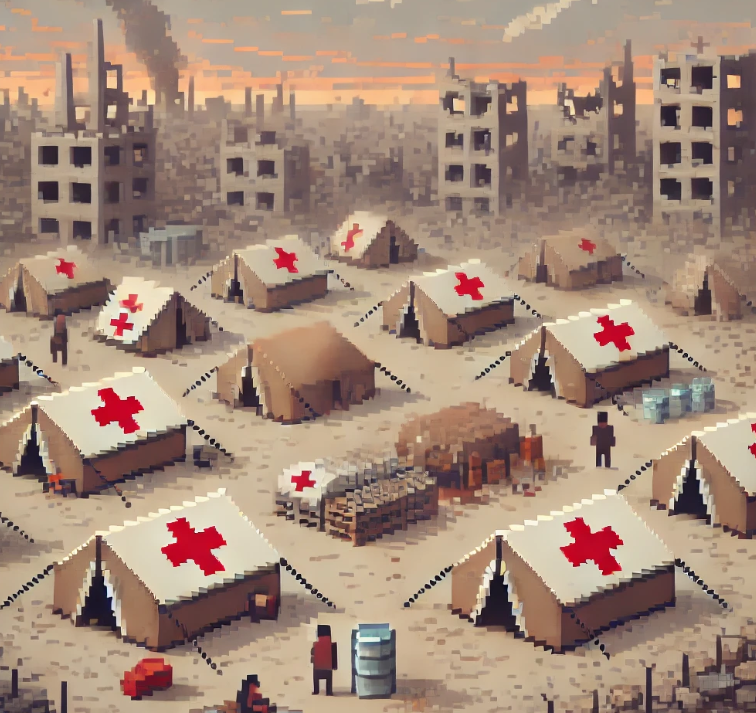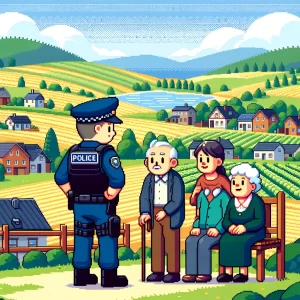
Training for Peace: The Role of Public Health in Preventing War
War and armed conflict have long been recognized as catastrophic events with profound effects on public health. The impact extends far beyond the immediate loss of life, infiltrating every aspect of society—from healthcare infrastructure to food and water security and even the mental well-being of individuals and communities. As such, the role of public health in both mitigating these effects and preventing conflict is becoming increasingly important. Yet, as recent research reveals, the integration of war prevention and peace promotion into public health training remains insufficiently developed, particularly in Europe.
This blog explores the findings of a recent scoping review that examined how public health education is currently addressing the competencies required for preventing war and promoting peace. We’ll discuss the gaps identified in existing training programs and why public health professionals must be equipped not only to respond to emergencies during conflicts but also to actively contribute to preventing wars in the first place.
The Far-Reaching Impact of War on Public Health
War is more than just a battle between armed forces; it is a public health disaster that disrupts the very fabric of society. When infrastructure is destroyed and healthcare systems are overwhelmed, the most vulnerable populations—women, children, the elderly, and those with chronic conditions—are left without access to essential services. This leads to a dramatic increase in mortality and morbidity, with long-term physical and psychological consequences for survivors. The devastation is so profound that even after the fighting stops, the path to recovery can take decades, if not longer.
In this context, public health is not limited to emergency response during active conflicts. Public health professionals have a vital role in preventing war and promoting peace. This responsibility includes addressing the root causes of conflict, such as social inequalities and injustices, and working towards dismantling the conditions that lead to violence.
Current State of Public Health Education: A Narrow Focus
The scoping review, which analyzed scientific literature on public health education related to war and peace, highlighted significant gaps in current training programs. Out of thousands of publications screened, only seven met the criteria for inclusion in the review. These studies primarily focused on emergency response and preparedness during conflicts, with little attention given to the prevention of war or the promotion of peace.
The competencies taught in these programs often parallel disaster management, emphasizing immediate actions during crises, such as responding to natural disasters or disease outbreaks. While these skills are undoubtedly important, they do not encompass the broader public health goals of preventing conflict and fostering peace.
For example, many existing programs train public health professionals in emergency medical response, logistics, and crisis communication. However, there is a noticeable lack of training on how to identify and address the social determinants of health that can lead to conflict, such as poverty, inequality, and discrimination. Additionally, the review found that peace promotion was rarely included in public health curricula, leaving professionals underprepared for their potential role in preventing wars.
The Case for Expanding Public Health Training
Given the increasing geopolitical tensions and conflicts around the world, from Ukraine to Yemen, the need for a comprehensive approach to public health training is more pressing than ever. Public health professionals must be equipped with the knowledge and skills to not only respond to health crises during wars but also to engage in peacebuilding and war prevention efforts.
The review suggests that public health education should adopt a more holistic framework that includes primary, secondary, and tertiary prevention strategies. Primary prevention would focus on addressing the root causes of war, such as economic inequality and political instability. Secondary prevention would involve reducing the harm caused during conflicts, such as providing medical care and support to affected populations. Tertiary prevention would concentrate on rebuilding health systems and communities in post-conflict settings.
By integrating these concepts into public health education, we can train a workforce that is better prepared to handle the complexities of war and peace. This approach would not only save lives during conflicts but also help to prevent wars from occurring in the first place.
Practical Implications: What Can Be Done?
To bridge the gap in public health training, educational institutions must revise their curricula to include war prevention and peace promotion. This could involve:
- Developing Interdisciplinary Programs: Public health education should collaborate with fields like international relations, sociology, and political science to provide a more comprehensive understanding of the causes of war and strategies for peacebuilding.
- Incorporating Case Studies: Real-world examples of successful peacebuilding efforts and the role of public health in these contexts can provide valuable lessons for students.
- Focusing on Social Determinants: Training should emphasize the importance of addressing social inequalities and injustices as part of a broader strategy to prevent conflict.
- Promoting Civic Engagement: Public health professionals should be encouraged to engage in advocacy and policy-making efforts that promote peace and prevent war.
Join the Conversation
We want to hear from you! What role do you think public health should play in preventing war? Have you ever been involved in a public health initiative that promoted peace or addressed the root causes of conflict? Share your thoughts and experiences in the comments below or join the discussion on social media.
Conclusion
War is a preventable public health crisis. By expanding public health education to include competencies in war prevention and peace promotion, we can build a workforce capable of addressing the complex challenges of our time. The findings of the scoping review are a call to action for educational institutions, public health professionals, and policymakers to rethink how we prepare for and respond to the threats of war. In doing so, we can help to create a more peaceful and healthier world for future generations.
Be Part of the Change – Get Weekly Updates!
Stay informed and connected. Subscribe for free and share this blog to make a difference in public health with others. If you liked this blog, please share it! Your referrals help This Week in Public Health reach new readers.



